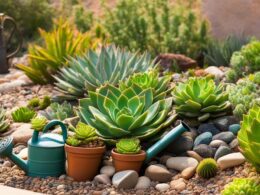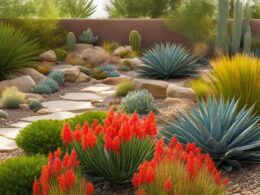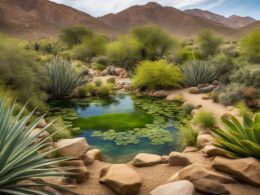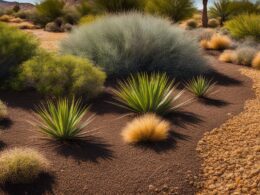Mulching is a gardening technique that can significantly reduce water usage and save resources. By implementing mulching in your garden, you can cut down on your water bill and contribute to water conservation efforts.
Key Takeaways:
- Mulching is an effective gardening technique to reduce water usage.
- It can help save resources and lower your water bill.
- Mulch acts as a protective layer that reduces evaporation and conserves soil moisture.
- Implementing mulching in your garden contributes to water conservation efforts.
- Start incorporating mulch into your gardening practices today and make a positive difference in water usage and resource conservation.
The Benefits of Mulching
Mulching offers various benefits for your garden. Firstly, it improves the quality of soil by breaking up clay and allowing better water and air movement. Mulch also provides nutrients to sandy soil, enhancing its ability to hold water. Additionally, mulch acts as a protective layer that reduces water evaporation from the soil, thereby reducing the need for frequent watering. It also helps to keep weeds at bay and makes weed removal easier. Furthermore, mulch acts as an insulator, keeping the soil cooler in the summer, which is beneficial for root growth.
Mulching provides numerous advantages for your garden:
- Improves soil quality by enhancing water and air movement
- Enhances the water-holding capacity of sandy soil
- Reduces evaporation, minimizing the need for frequent watering
- Controls weed growth and facilitates weed removal
- Helps maintain cooler soil temperatures for optimal root growth
“Mulching is a gardening technique that not only saves you time and effort but also improves the overall health of your plants. By using mulch, you can create the ideal environment for your garden to thrive and flourish.”
To visually demonstrate the benefits of mulching, please refer to the table below:
| Benefit | Description |
|---|---|
| Improved Soil Quality | Mulch breaks up clay and enhances water and air movement in the soil, promoting better plant growth. |
| Increased Water Retention | Mulch helps sandy soil retain moisture, reducing the need for frequent watering and conserving water resources. |
| Weed Control | Mulch acts as a barrier, preventing weed growth and making it easier to remove any existing weeds. |
With these significant benefits, it’s clear that mulching is a valuable technique for any gardener. By implementing mulch in your garden, you can improve soil quality, reduce water usage, control weeds, and create an optimal environment for your plants to thrive.
Using Mulch for Water Conservation
When it comes to conserving water in your garden, using mulch is an effective and sustainable solution. Mulch helps to retain soil moisture and reduce evaporation, allowing you to save water while maintaining healthy plants. To make the most out of mulching, it’s important to follow a few key guidelines.
Preparing the Soil
Prior to applying mulch, it is essential to prepare the soil. Start by removing any weeds and thoroughly watering the area. This ensures that the soil is ready to receive the mulch and facilitates better water absorption. By starting with a clean and hydrated soil, you can maximize the water-saving benefits of mulching.
Applying the Mulch
When applying mulch, the depth is crucial to its effectiveness. Aim for a depth of 2 to 4 inches throughout the planting areas. Finer mulches, such as small bark chips, should not exceed 2 inches in depth. Maintaining the proper depth helps to conserve moisture and prevent weeds from sprouting.
It’s also important to keep the mulch a few inches away from the base of trees and shrubs. This prevents excessive moisture retention around the trunk, which can lead to root rot and other issues. By maintaining a proper distance, you can protect the health of your plants while still benefiting from the water-saving properties of mulch.
Mulching Around Trees and Shrubs
Mulching around trees and shrubs not only conserves water but also provides additional benefits. The layer of mulch acts as a protective barrier, insulating the soil and regulating temperature fluctuations. This is particularly beneficial for the roots of young trees and shrubs, helping them establish and grow in a healthy manner.
By using mulch in your garden and following these guidelines, you can significantly reduce water usage without compromising the health and vitality of your plants. Mulching is a simple and effective technique that contributes to water conservation efforts and promotes sustainable gardening practices.
Mulching for Water Conservation in Golf Courses
Golf courses are notorious for their high water usage, especially in arid climates. However, by implementing mulching techniques in specific areas of the course, such as the rough or areas with heavy tree cover, significant water conservation can be achieved. Mulch acts as a ground covering that minimizes evaporation and helps retain moisture in the soil, reducing the need for excessive watering. This not only contributes to water conservation efforts but also leads to substantial cost savings for golf courses by reducing water bills.
According to a study conducted by the Golf Course Superintendents Association of America, using mulch in targeted areas can result in a 30-50% reduction in water usage. The study found that mulch helps retain soil moisture, reduces evaporation, and improves water infiltration into the soil. By creating an environment that retains moisture, golf courses can maintain healthier turf and reduce the risk of drought stress.
Additionally, mulch can provide other benefits to golf courses, such as weed control and erosion prevention. The layer of mulch acts as a barrier, preventing weed growth and reducing the need for herbicides. Mulch also helps prevent soil erosion by reducing water runoff and protecting the soil surface from heavy rain. These additional benefits make mulching a valuable tool for golf courses looking to improve sustainability and resource management.
Table: Water Usage Reduction with Mulching in Golf Courses
| Golf Course Area | Water Usage Reduction |
|---|---|
| Rough | 30-50% |
| Tree-covered areas | 30-40% |
Mulching for Water Conservation in Housing Developments
Housing developments provide an excellent opportunity for mulch usage and water conservation. By implementing mulching techniques, developers can address erosion prevention and create eco-friendly landscaping designs that benefit both the environment and the residents. Mulch acts as a protective layer that reduces soil erosion caused by heavy rain and strong winds, preventing the loss of valuable topsoil and keeping the landscape intact.
Not only does mulch help prevent erosion, but it also promotes water conservation in housing developments. By acting as a barrier between the soil and the sun, mulch reduces evaporation rates, allowing the soil to retain moisture for longer periods. This means that less water is needed for irrigation, resulting in significant water savings. Additionally, mulching helps regulate soil temperature, protecting plant roots from extreme heat and cold, and promoting overall plant health.
Eco-friendly landscaping practices are becoming increasingly important in housing developments. By incorporating mulch into landscaping designs, developers can showcase their commitment to sustainability and attract environmentally-conscious buyers. Mulch provides a visually appealing finish to flower beds, pathways, and tree bases, adding natural beauty to the landscape while conserving water. In addition, the use of organic mulches, such as wood chips or straw, further enhances the eco-friendly nature of the development by reducing the need for synthetic fertilizers and herbicides.
Benefits of Mulching in Housing Developments:
- Prevents erosion and keeps the landscape intact
- Reduces water evaporation and promotes water conservation
- Regulates soil temperature for optimal plant growth
- Enhances visual appeal and adds natural beauty to the landscape
- Supports eco-friendly landscaping practices
In summary, mulching plays a crucial role in water conservation efforts in housing developments. By mitigating erosion, conserving water, and promoting eco-friendly landscaping practices, mulch helps create sustainable and visually appealing environments. Developers and homeowners alike can contribute to water conservation and make a positive impact on the environment by incorporating mulching techniques into their landscaping designs.
Mulching for Water Conservation in Commercial Buildings
Commercial buildings, including office complexes, shopping centers, and industrial facilities, have a significant impact on water consumption. Implementing mulching in the landscaping of these buildings can play a vital role in water conservation efforts. Not only does mulch help retain soil moisture and reduce water evaporation, but it also provides several other benefits that contribute to the sustainability of commercial buildings.
LEED Certification and Water Conservation
Commercial buildings often strive to achieve LEED (Leadership in Energy and Environmental Design) certification, which recognizes their commitment to sustainable practices. Water conservation is one of the key criteria for LEED certification. By incorporating mulching into the landscaping design, commercial buildings can meet the water conservation requirements and enhance their chances of obtaining LEED certification.
According to a study by the University of Florida, mulching around young trees in commercial landscapes can reduce their water needs by approximately 54 percent. This significant water-saving potential makes mulch an essential component in achieving LEED certification and promoting sustainability in commercial buildings.
Young Tree Care and Mulching
Young trees are particularly vulnerable to water stress and require careful maintenance. Mulching plays a crucial role in the care of young trees by providing several benefits:
- Conserves Moisture: Mulch helps retain moisture in the soil, reducing the frequency of watering for young trees.
- Reduces Competition: Mulch suppresses weed growth around trees, minimizing competition for water and nutrients.
- Insulates the Soil: Mulch acts as an insulator, protecting the roots of young trees from extreme temperature fluctuations.
- Prevents Soil Erosion: Mulch helps prevent soil erosion caused by heavy rains or irrigation, ensuring the stability of the tree’s foundation.
By incorporating mulching into their landscaping practices, commercial buildings can take proactive steps to care for young trees, conserve water, and create a sustainable environment.
The Role of Mulch Producers
Mulch producers play a critical role in promoting water conservation in commercial buildings. By producing high-quality mulch products and raising awareness about their water-saving benefits, mulch producers can support the sustainability goals of commercial developers and landscapers.
In collaboration with green industry professionals, mulch producers should educate commercial building owners and managers about the positive impact of mulching on water conservation. By emphasizing the role of mulch in reducing water usage and obtaining LEED certification, mulch producers can inspire the adoption of sustainable landscaping practices in commercial buildings.
With mulch producers taking an active role in water conservation efforts, commercial buildings can become more environmentally friendly, reduce their water footprint, and contribute to a more sustainable future.
The Role of Mulch Producers in Water Conservation
Mulch producers play a crucial role in water conservation efforts by providing high-quality mulch and promoting its benefits. With their sustainable practices and dedication to preserving water resources, mulch producers contribute to a more environmentally friendly landscaping industry.
By producing mulch that effectively retains moisture and reduces evaporation, mulch producers help gardeners, golf courses, housing developments, and commercial buildings conserve water. Their products act as a protective layer, minimizing water loss and maintaining soil moisture levels.
Additionally, mulch producers can collaborate with landscapers and green industry professionals to raise awareness about the importance of mulching for reduced water usage. By educating the public and emphasizing the multiple benefits of mulch, including water conservation and improved soil quality, they can encourage more individuals and businesses to adopt sustainable gardening practices.
Table:
| Mulch Producer Contribution | Impact on Water Conservation |
|---|---|
| Producing high-quality mulch | Reduces water evaporation and conserves soil moisture |
| Collaborating with landscapers | Raises awareness and promotes sustainable gardening practices |
| Education and communication | Encourages individuals and businesses to adopt mulching for water conservation |
Through their efforts, mulch producers contribute to water conservation and sustainability on a larger scale. By choosing mulch as a landscaping material, individuals and businesses actively participate in reducing water usage and supporting eco-friendly practices. Together, with the help of mulch producers, we can make a positive impact on our environment and ensure a greener future.
Mulch as an Eco-Friendly Solution
Mulch plays a crucial role in addressing the climate crisis by promoting water conservation and sustainability in landscaping practices. By using mulch, individuals and businesses can actively contribute to reducing water usage and minimizing their environmental impact. The ability of mulch to conserve water makes it an attractive solution for those looking to adopt eco-friendly practices and protect our planet for future generations.
Water conservation is a pressing issue in today’s world, and mulch offers a practical and effective solution. By creating a protective layer on the soil surface, mulch helps reduce evaporation and retain moisture, minimizing the need for frequent watering. This not only saves water but also helps maintain soil health and promotes optimal plant growth.
Furthermore, using mulch in landscaping designs can greatly contribute to sustainable practices. Mulch acts as a natural weed suppressor, reducing the need for chemical-based weed control methods. It also acts as an insulator, regulating soil temperature and protecting plant roots from extreme heat or cold. By incorporating mulch into your landscaping plans, you can create a visually appealing environment while minimizing water usage and supporting eco-friendly practices.
As we face the challenges of the climate crisis, it is essential to embrace sustainable solutions like mulch. Mulch producers play a vital role in promoting water conservation and sustainability by providing high-quality mulch and educating consumers about its benefits. Together, we can make a significant impact in mitigating the effects of the climate crisis and preserving our precious water resources.
Table: Benefits of Mulch for Water Conservation
| Benefits | Description |
|---|---|
| Reduced Water Usage | Mulch acts as a protective layer, reducing evaporation and conserving soil moisture. |
| Weed Control | Mulch suppresses weed growth, reducing the need for chemical weed control methods. |
| Soil Health | Mulch improves soil quality by enhancing water and air movement, promoting optimal plant growth. |
| Eco-Friendly Landscaping | Using mulch in landscaping designs helps create visually appealing and sustainable environments. |
Conclusion
Mulching is a highly effective gardening technique that can significantly reduce water usage, making it an essential tool for water conservation and sustainable landscaping practices. The scientific experiments conducted at Texas A&M University and the various benefits discussed in this article all highlight the effectiveness of mulch in conserving water and promoting a more environmentally friendly approach to gardening.
Whether you are a homeowner, a golf course manager, a housing developer, or a commercial building owner, incorporating mulch into your landscaping can contribute to water conservation efforts and reduce your environmental impact. By creating a protective layer on the soil surface, mulch helps prevent water evaporation, conserves soil moisture, and reduces the need for frequent watering. This not only saves water but also leads to cost savings and promotes a more sustainable approach to landscaping.
Mulch producers play a vital role in promoting water conservation and sustainability. By producing high-quality mulch and effectively communicating its benefits, they can help drive the adoption of water-efficient gardening practices across various markets. Together with gardeners, golf courses, housing developments, and commercial buildings, mulch producers can make a significant difference in reducing water usage and protecting our precious resources.
So, start incorporating mulch into your gardening practices today and join the movement towards water conservation and sustainable landscaping. Together, we can make a positive impact on our environment and create a greener, more sustainable future.
How Does Mulching Help Reduce Water Usage in Gardening?
Mulching is a key strategy to master water conservation techniques in gardening. By covering the soil with organic materials like wood chips or straw, mulching helps retain moisture, reducing the need for frequent watering. It also prevents evaporation and keeps the soil cool, promoting healthier plant growth while saving water.
FAQ
What is mulching?
Mulching is a gardening technique that involves covering the soil surface with a layer of material, such as wood chips or straw, to conserve moisture, control weeds, and improve soil health.
How does mulch reduce water usage?
Mulch acts as a protective layer that reduces water evaporation from the soil surface, resulting in less water loss. It helps conserve soil moisture and reduces the need for frequent watering.
Can mulch improve soil quality?
Yes, mulch improves soil quality by promoting better water and air movement. It breaks up clay soil and enhances the water-holding capacity of sandy soil.
How should I apply mulch?
Before applying mulch, remove weeds and water the area thoroughly. Aim for a depth of 2 to 4 inches of mulch in all planting areas. Keep the mulch 6 to 12 inches away from the base of trees and shrubs to avoid moisture retention around the trunk.
Can mulch be used on golf courses?
Yes, using mulch in areas such as the rough or heavily tree-covered areas of golf courses can significantly reduce water usage. Mulch acts as a ground covering that minimizes evaporation and helps retain moisture in the soil.
How can mulching benefit housing developments?
Mulching can help prevent erosion on greenfield sites and minimize the destruction of natural habitats. It also addresses water drainage issues and contributes to visually appealing and eco-friendly landscaping designs.
How does mulch contribute to water conservation in commercial buildings?
Mulching around young trees in commercial landscaping designs can reduce their water needs by approximately 54 percent. Using mulch helps meet water conservation criteria for LEED certification and contributes to sustainability goals.
What is the role of mulch producers in water conservation?
Mulch producers play a crucial role in promoting water-efficient gardening practices. By producing high-quality mulch and effectively communicating its benefits, they can help conserve water and contribute to sustainability efforts on a larger scale.
Is mulch an eco-friendly solution?
Yes, mulch is an eco-friendly solution for reducing water usage in landscaping. By choosing mulch as a landscaping material, individuals and businesses can actively participate in water conservation and support sustainable practices.














